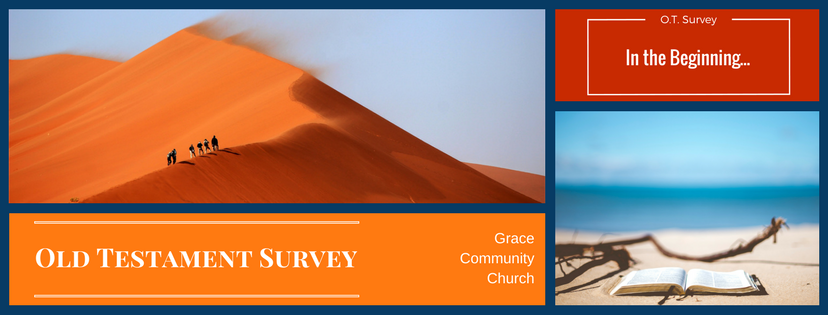In a Nutshell…
Read the passages here and here.
Today, we’re beginning a series on the Old Testament. Obviously, this is a pretty big endeavour as the O.T. encompasses 2/3 of the bible. Thankfully, unlike John and Ephesians, we’re not going to go through every word of the O.T. Rather, we are going to try to do this survey style – we will hit some of the main points and try to get an overview of what’s going on.
Surprisingly, many Christians haven’t spent much time in the Old Testament. There may be a belief that, with the New Testament, the Old Testament is obsolete or at least superseded. Which forces us to ask the question:
Why study the O.T.?
Firstly the New Testament (N.T.) assumes the Old Testament (O.T.). All of the N.T. writers, as well as Jesus himself, clearly understand the O.T. as the authoritative word of God. In the passages that we are looking at today, as well as the others in the N.T. that refer to scripture, it is the O.T. that is assumed. Therefore, it is the Old Testament that informs and influences development of early Christian theology
The revelation of Jesus (the fullest revelation of God and the perfect example of humankind) forced the early church, in many ways, to re-think and re-examine their understandings of God, Israel, and salvation, but their starting point and their grounding point was the Old Testament. The book of Hebrews is the most obvious (explicit) example of this being worked out in the early church understanding.
Therefore, the O.T. provides the cultural and theological context from which the early church develops. Therefore, for example, we can’t understand Church without understanding Israel. Likewise, the sacrificial system outlined in the O.T. is crucial for our understanding of atonement.
All of this to say that we have been given both the Old Testament and New Testament, and indeed we cannot separate the two, as the whole word of God. It is in fact the one testament to who God is and what He is doing in this world.
This being the case, why don’t we as Christians pay more attention to the New Testament?
Some of us feel that the O.T. is unnecessary – that all we need is the N.T. We’ve already dealt with some of this above. But let me also add that, inasmuch as both the O.T. and the N.T. are the entire word of God, we pay attention because it is God speaking to us. It is God revealing to us who He is, who we are, and how He is making us who we were meant to be.
Some of us avoid the O.T. because we think that it is boring or difficult. About these two points, let me just say that, like most things, we cannot avoid something just because it is difficult. In fact, most worthwhile things are difficult. And also, the more you do it, the more proficient you become at it. And the more proficient you get at it, the more you are able to hear and understand the voice of God in the word of God, you will find it impossible to not find it the furthest thing from boring.
So What Now…?
Hopefully, as we work through the O.T., we will be able to hear the word of God to us today and see how it relates to our lives. Here are some tips for reading the O.T. (and not just the O.T. but all of the bible):
- Genre – understanding what kind of text we are reading is important. Is it history? Is it law? Is it poetry? etc. We cannot read the story of Abraham in the same way we read the book of Job. We want to understand the difference between prophecy and apocalyptic.
- Context – We want to pay attention to the context of the text we are reading. This will include:
- Literary – how is the text put together as it is? What are some of the literary clues that will help us understand this text?
- Cultural – how would the people in the text’s original context have understood this text? What are the customs, traditions, and assumptions that would have influenced their hearing and how do we translate it to our culture today?
- Prayer – as we read, we want to do so prayerfully, asking God to reveal truth to us and listening to the Spirit speaking to us. We must always remember that the Bible is God’s word to us, not our interpretation that matters.
- Community – we also want to read in community. By that, we mean that we want to avoid reading in isolation. When we look only for “what the text means to me,” we run the risk of finding only what we hope to find. We want to let others in the body of Christ, both present and past, help us hear the word of God to the whole people of God.
As we work through the O.T. we will see several themes repeated over and over. Pay attention to these themes. What does this tell us about the character of God? What does this tell us about the people of Israel. What does the O.T. have to say about grace and sovereignty? Why is the Law so important?
I hope that you are as excited as I am to hear God speaking to us, even today.
